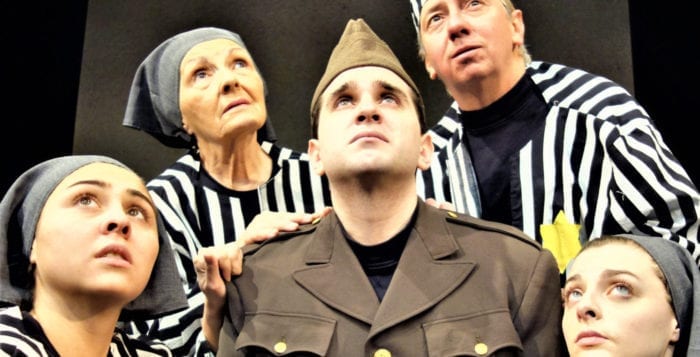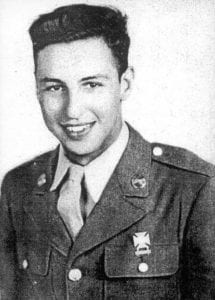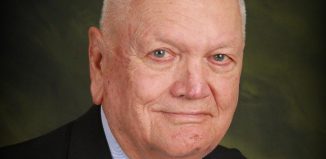A lesson in history ‒ Theatre Three’s ‘From the Fires: Voices of the Holocaust’

By Sabrina Petroski
“Just another body for the ovens.” Haunting, isn’t it? This sentence comes from Theatre Three’s educational touring show “From the Fires: Voices of the Holocaust.” This play, the story of two young Jewish girls living through the reign of Hitler and the persecution of the Jewish people, has been presented in schools and community centers across the tristate area, going as far south as Washington and Virginia, and as far north as Richmond Hill, outside of Toronto, Canada.
“From the Fires” was written by Jeffrey Sanzel, the executive artistic director of Theatre Three in Port Jefferson and has been touring since 1996. According to Sanzel, he has always been passionate about the Holocaust and making sure the atrocious events of the past never disappear.
The cast
Nicole Bianco
Marci Bing
Michelle LaBozzetta
Douglas J. Quattrock
Jeffrey Sanzel
Steven Uihlein
When Theatre Three was looking for a new show for its educational program, Sanzel began searching for a show within the topic of the Holocaust, but none of them seemed right. Eventually, he decided to write one, immersing himself in research, finding survivors to interview and spending three days at the United States Holocaust Memorial Museum in Washington, D.C. After five months of writing, the cast, including Sanzel, went into rehearsal with an unfinished script, which was edited and rewritten over the six weeks of rehearsal.
“‘From the Fires’ has had an amazing response,” said Sanzel in a recent interview. “If it hadn’t we wouldn’t still be touring it this many years later! There has been an incredibly positive reaction.”
According to Sanzel, there are many schools, synagogues, churches and community centers all over Long Island that book the show every year or every other year. Michael Serif, a history teacher at Friends Academy in Locust Valley, first experienced “From the Fires” at Seaford High School in 2001. Since then, Serif has requested to bring the 40-minute play to every school he has worked in, including Locust Valley High School and Friends Academy. The theatrical piece is performed for grades 6 to 12.
“I’ve seen the play probably close to a dozen times in several different schools, and every time when the show is complete you can hear a pin drop in the audience,” said Serif in a phone interview. “The kids are so very deeply affected by the play.”
“From the Fires” depicts the Holocaust through the eyes of Rachel and Evy, two young girls from Berlin who grew up watching the world turn from a peaceful place to a place where people are ripped from their homes and murdered because of their religion.

It begins with the liberation of the Mauthausen Concentration Camp in 1945 by a young soldier, then flashes back to 1937 where the audience sees Rachel, Rachel’s father and Evy go through all the changes in the laws and their lives; Rachel’s father losing his business, Rachel and her father going into hiding; Rachel, Evy and Rachel’s father being deported; Rachel’s father being killed in a gas chamber; and Rachel carrying Evy through the hardships they experience at the concentration camp. Sanzel says that having the story told by two young girls resonates more with younger viewers.
“One comment that a teacher made to their students was that part of the play’s power was that it reminds you that the people who went through this were just like you,” said Sanzel.
“The kids in the audience can see themselves in Rachel and Evy. Any survivors they would have met would be in their eighties and nineties, and they don’t think of them as themselves. ‘From the Fires’ puts it in perspective; it follows two kids who could be any two kids, and it gives it that universal connection.”
The play has a small cast, with each actor portraying up to half a dozen roles throughout the show, and keeps to a minimalistic set. A very important part of the show, according to Sanzel, is how the gradual change in the laws is shown.
“From the Fires” is meant for young audiences so there is no graphic content shown on stage. “You get to see their day-to-day lives, the change in the laws, and then of course the concentration camp,” said Sanzel. “It’s all an emotional appeal. There’s nothing graphic in the play so it’s angled to be watched from that standpoint. On stage you can’t really re-create the horrors of the Holocaust, so we emphasize the personal — the personal losses, the personal survival.”
‘Those who don’t learn from history are doomed to repeat it, and that’s why it’s so important to keep teaching it. ‘
— Jeffrey Sanzel
“From the Fires” is a work of historical fiction, one character is based on a real person. In May of 1945, Army medic John D’Aquila aided in the liberation of the Nazi death camp in Mauthausen, Austria. D’Aquila, a Theatre Three board member at the time the play was being created, was the inspiration for the American soldier who provides the framing device. While Sanzel was researching and writing the play, D’Aquila shared his personal experience, voicing things he had never said before.
“It was the first time he had ever spoken about his experience of liberating the camp because they were told when they went home not to talk about it, just to go back to their lives” said Sanzel. “He became the basis for the American soldier that opens and closes the show, and over the years [D’Aquila] would come to many of the road performances and in-house shows to speak. It became a passion for him to be connected to this because it was cathartic.” A resident of Belle Terre, D’Aquila passed away in 2014 at the age of 91.
After every performance the cast holds a Q&A, where the audience can ask questions about the performance, about the cast or about the Holocaust in general. Sanzel said that the questions he hears the most are, “Are you Jewish?” and “Did this actually happen?”
“From the Fires” opens doors to educating younger generations that reading from a textbook doesn’t. According to Serif, many of the history and English teachers within Friends Academy take the play and use it as a teaching opportunity, talking about it in class for days after and even referring back to it throughout the rest of the year.
“The children often ask complicated questions, so we give them our best answer and then encourage them to go back to their classes and talk about it in more detail,” explained Sanzel.
According to Sanzel, there are two main reasons he does the show. The first is to keep this event in history alive, so after those that experienced it firsthand are gone the stories don’t disappear with them. The second is to teach kids that they can stop things like the Holocaust from happening again. It all boils down to bullying, seeing someone being harassed and choosing to say something instead of sitting idly by while it happens, or even joining in. The Holocaust was made up of people joining in or ignoring the bad things because it didn’t personally affect them.
“There’s a danger in people thinking of history as ‘back then,’ that’s how we begin to let go of things and we can’t,” said Sanzel. “Those who don’t learn from history are doomed to repeat it, and that’s why it’s so important to keep teaching it.”
For more information or to book a performance, contact Theatre Three’s touring coordinator Marci Bing at 631-928-9202 or [email protected].






